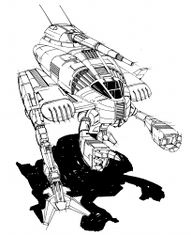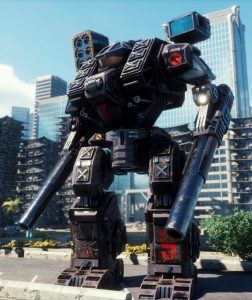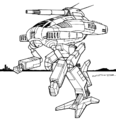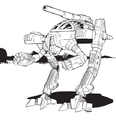Hussar

| |
| Hussar | |
|---|---|
| Production information | |
| Manufacturer | Bonn Mekarmorwerks[1]
|
| Production Year | 2620[2] |
| Model | HSR-200-D[1] |
| Class | Light |
| Cost | 2,790,840 C-bills |
| Technical specifications | |
| 'Mech type | Inner Sphere BattleMech |
| Mass | 30 tons |
| Chassis | Benztrov 40 |
| Armor | Lexington Limited High Grade Ferro-Fibrous |
| Engine | GM 270 |
| Communications System | Field Ranger Sightseer |
| Targeting Tracking System | Ranger LAF Model 2 |
| Heat Sinks | 10 double |
| Speed | 151 km/h |
| Armament | |
| BV (1.0) | 498[3] |
| BV (2.0) | 636[1][4] |
Contents
Description[edit]
The Hussar was one of the Star League Defense Force's most popular and widely used recon 'Mechs since its introduction in 2620. It was originally conceived and constructed as an infantry support 'Mech, but, as it reached units its incredible speed naturally lent the Hussar to a scouting role, and eventually allowed it to take the place of the majority of light scout vehicles in use at the time. Its excellent communications gear allowed the Hussar to operate deep behind enemy lines while its incredible speed made it hard to target and allowed the 'Mech to quickly disengage from a fight. An example of this can be found in the Fifty-first Hussar Regiments actions on Wotan in 2630.[5][6] Its most significant drawback however was thin armoring - less even than that found on a Locust - and a weapon payload which left it vulnerable to close-in fighting. During battle it most often skirted the edge of combat and harassed the enemy at long range; Hussars were also often deployed in support of Thorn units.[7][8]
The vast majority of Hussars were assigned to the SLDF and the Star League maintained a tight control over Newhart Industries. The only time any of the Great Houses were able to acquire the 'Mech was either through salvage or so-called "shipping errors." This scarcity was further affected during the Amaris Civil War when the Hussar's New Earth factory was destroyed in 2776. Thus when the Star League collapsed and General Kerensky led most of the SLDF on Operation EXODUS, the Hussar practically disappeared from the Inner Sphere. What few Hussars remained were forced to make do with lesser parts as the knowledge behind their advanced components became lostech. The 'Mech remained a rarity until Operation ROSEBUD, when ComStar supplied stripped-down HSR-300-D variants to the Draconis Combine prior to the War of 3039.[4][9]
Original Hussars were also used by the Com Guards, and during the Clan Invasion the design was among several selected to be upgraded to so-called Clanbuster variants prior to the Battle of Tukayyid. After the ComStar Schism the organization opened its vaults, allowing Coventry Metal Works to buy the rights to the design, including its original specifications and a new HSR-400-D variant being developed by Bonn Mekarmorwerks. Starting in 3055, CMW began producing both 200 and 400 models for the Armed Forces of the Federated Commonwealth, although it predominantly served in Loyalist units in the FedCom Civil War. Hussar mortality rate was excessively high during this time since many Lyran pilots often train for stand-up fights in heavier 'Mechs; eventually tactics changed to accommodate the weak armor and high speed of the design. Afterwards, the Hussar continued to serve in the Lyran Alliance Armed Forces with new 'Mechs built out of Coventry until 3068 when the planet came under attack by the Word of Blake.[4]
Weapons and Equipment[edit]
The Hussar has a single weapon on its chassis in a unique turreted mount on the center torso, a Newhart ER large laser. While the use of a single weapon limits the defensive capabilities of the Hussar, the superior reach of this weapon allows the 'Mech to engage enemies at a stand-off range, and its speed means the Hussar can dictate the range of the engagement. If enemies do get too close the Hussar can still engage in physical combat with kicks and punches, but this is less than ideal. 10 double heat sinks are enough to keep the 'Mech cool in combat, but only one and a half tons of ferro-fibrous armor makes the Hussar among the least-protected 'Mechs ever built.[7][8]
The Hussar's Ranger-brand communications and targeting-tracking systems are superior to most other electronic systems, with greater range for improved reconnaissance capabilities. The Sightseer in particular is capable of jamming most signals and tapping into communications between enemy 'Mechs up to 35 kilometers distant. This makes several well-placed Hussars capable of completely disrupting an enemy's communications network, although they would more often be used to report on enemy movements and orders. While among those components most likely to be replaced with inferior technology, towards the end of the Third Succession War a quarter of Hussars in service were still equipped with the original Ranger systems.[7][8]
Variants[edit]
- HSR-200-Db
- An upgrade of the 200 introduced in 2735 and used exclusively by SLDF Royal units, the 200Db is powered by an XL engine. This enables an upgrade of the 'Mech's electronics with a Beagle active probe and a Guardian ECM suite in the side torsos. In addition, the armor coverage is increased to five and a half tons.[10] BV (2.0) = 934[11][12]
- HSR-300-D
- The 300-D Hussar is a simple downgrade of the 200-D Hussar, gifted to the Draconis Combine by ComStar in 3035. The primary changes in the design are the replacement of the ER large laser with a standard Defiance B3L large laser, single heat sinks in place of the double-strength models, and replacement of the ferro-fibrous armor with standard Riese Reliable armor at a negligible cost to the already weak armor protection. In place of the advanced electronics the HSR-300-D uses the Garret T10B communications system and the Dynatec 990 targeting and tracking system.[1][9] BV (1.0) = 484; BV (2.0) = 543[13]
- HSR-350-D
- This Combine variant on the 300-D was introduced in 3038. It lowers the Hussar's top speed to 129.6 km/h by replacing the engine with a Pitban 240. The weight saved from the smaller power plant was used to add a medium laser to each arm and an extra ton of armor. BV (2.0) = 731[14]
- HSR-400-D
- One of the so-called "Clanbuster" upgrades developed by ComStar in 3052, the 400-D is an extreme modification of the original Hussar. The ER large laser and engine have both been stripped from the chassis to make room for an LB 10-X AC with one ton of ammo, an additional one and a half tons of armor, and a GM 240 XL engine, reducing the Hussar's speed to 129.6 km/h. This variant of the Hussar, due to the cluster rounds that can be fired from the LB-X autocannon, performs admirably in anti-vehicle screening forces.[1][15] BV (1.0) = 534; BV (2.0) = 615[16]
- HSR-500-D
- The 500-D Hussar, built by Bonn Mekarmorwerks and introduced in 3060, follows the pattern of many of the recon 'Mechs of that era by adding advanced electronics to the mix. Once again, the engine has been replaced by an XL engine, retaining the amazing speed for which the Hussar is famous for. The primary weapon on this version is an ER PPC, and the targeting system has been mated to an improved C3 computer, making it deadly accurate at long range when working closely with other units. BV (1.0) = 867; BV (2.0) = 980[17]
- HSR-600-D
- Bonn Mekarmorwerks produced this version in 3060. It featured and ER PPC and C3i technology.[1]
- HSR-900-D
- This variant that only saw limited production in 3067 retains the speed of the original, but is powered by a light fusion engine. The increased weight of the engine required stripping out the weapons and reducing the armor protection from the levels of the 500-D, even with the inclusion of heavy ferro-fibrous armor. It is armed only with a light AC/2 that is fed by a single CASE-protected bin, limiting the ability of the autocannon to use special munitions. The 900-D was only in the prototype stage when the Word of Blake attacked Coventry, and afterwards it could be found in service with the Word of Blake Militia.[1][4] BV (2.0) = 551[18]
- HSR-950-D
- An upgrade of the 900-D produced for the Blakists in 3070, the 950-D is built on a standard frame, but with the equipment replaced with two ER medium lasers and a snub-nose PPC. This variant has the most armor of any Hussar variant thanks to its use of a heavy ferro-fibrous weave armor. BV (2.0) = 965[19]
Design Quirks[edit]
The Hussar has the following Design Quirks:[20]
Notes[edit]
- Author Blaine Lee Pardoe stated in a blog entry that, according to his memory which he admitted could be wrong, the Hussar was among the BattleMechs for which he wrote the original background as initially published in TRO:2750; for some of these he also designed the stats. Regarding the Hussar specifically, he noted that "I know it is universally hated, but I am proud of the design. It is a 'Mech version of a Savannah Master. Fast, toilet paper for armor, annoying weaponry. Get this behind the enemy and wreck havoc. That was what it was designed to do."
- In German products, the unit's proper name was translated to Husar; the model code was left unchanged.
Gallery[edit]
A Hussar emblazons TRO:2750 cover
A charging HSR-300-D Hussar from TRO:3025 Revised
HSR-300-D Hussar from TRO:3039
HSR-200-D Hussar from TRO:3050 Upgrade
An HSR-400D Hussar during the Battle of Tukayyid from Tukayyid
HSR-200-D Hussar in motion from CCG
References[edit]
- ↑ 1.0 1.1 1.2 1.3 1.4 1.5 1.6 1.7 Technical Readout: Succession Wars, pp. 24–25: "HSR-200-D Hussar"; reprinted from Technical Readout: 3050 Upgrade
- ↑ MUL online date for the Hussar
- ↑ Combat Operations, p. 106
- ↑ 4.0 4.1 4.2 4.3 Technical Readout: 3050 Upgrade, pp. 192–193
- ↑ Technical Readout: 2750, p. 24: "Capabilities"
- ↑ Technical Readout: 3025 Revised, p. 16: "Overview"
- ↑ 7.0 7.1 7.2 Technical Readout: 2750, pp. 24–25
- ↑ 8.0 8.1 8.2 Technical Readout: 3025 Revised, pp. 16–17
- ↑ 9.0 9.1 Technical Readout: 3039, pp. 252–253
- ↑ Technical Readout: 3075, p. 169
- ↑ Record Sheets: 3075 Unabridged, p. 156
- ↑ Record Sheets: 3075 Unabridged - Age of War, p. 16
- ↑ Record Sheets: 3039, p. 73
- ↑ Record Sheets: 3039, p. 74
- ↑ Tukayyid, pp. 12–17: "Com Guard 'Mechs"
- ↑ Record Sheets: 3050 Upgrade (Clan & Star League), p. 72
- ↑ Record Sheets: 3050 Upgrade (Clan & Star League), p. 73
- ↑ Record Sheets: 3050 Upgrade (Clan & Star League), p. 74
- ↑ Record Sheets: 3050 Upgrade (Clan & Star League), p. 75
- ↑ BattleMech Manual, p. 92: Design Quirk Table - Hussar Entry
Bibliography[edit]
- BattleMech Manual
- Combat Operations
- Master Unit List: Battle Values
- Record Sheets: 3025/3026
- Record Sheets: 3039
- Record Sheets: 3050
- Record Sheets: 3050 Upgrade (Clan & Star League)
- Record Sheets: 3067
- Record Sheets: 3075 Unabridged
- Record Sheets: 3075 Unabridged - Age of War
- Technical Readout: 2750
- Technical Readout: 3025 Revised
- Technical Readout: 3039
- Technical Readout: 3050
- Technical Readout: 3050 Revised
- Technical Readout: 3050 Upgrade
- Technical Readout: 3075
- Tukayyid









